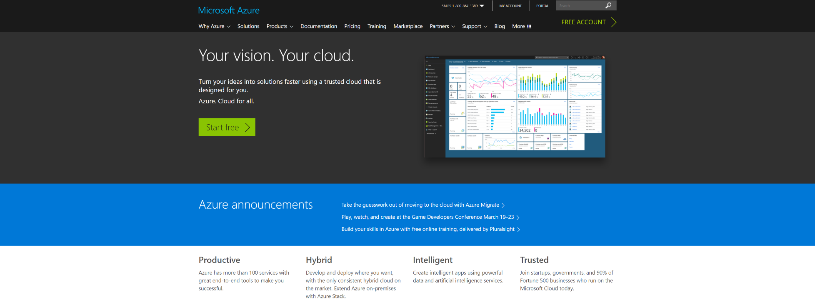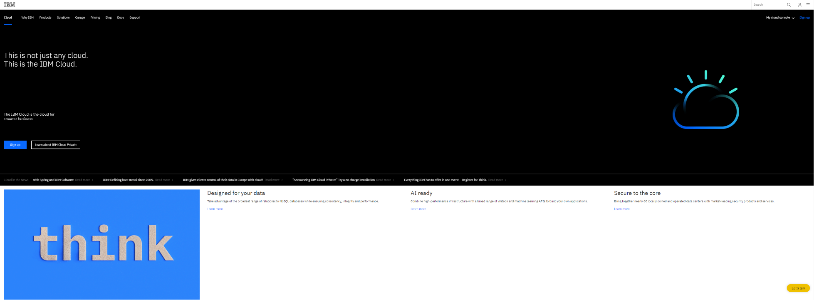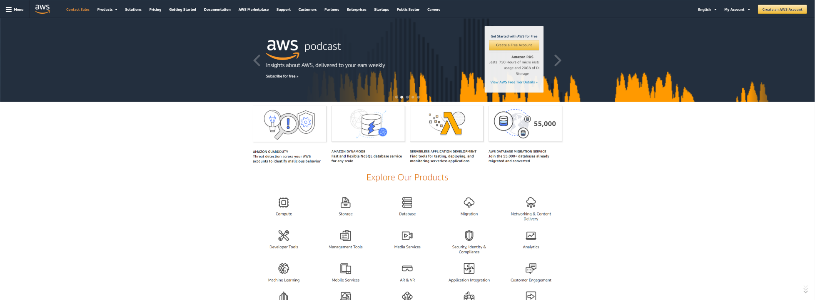Top 10 Best Cloud Computing Providers for Small Business
Have you heard about cloud computing? Have you ever wondered what cloud computing is and how it works? I must say, many people are not aware about the nature of cloud computing, much more so its existence. But if you are curious about it, you are in for a big surprise as the cloud computing domain will not be a vague haze anymore. This article will talk about what cloud computing is, its nature and most importantly, the top ten cloud computing providers as of last year will be finally revealed.
What is cloud computing?
Cloud computing is a technology in the computing industry that uses the internet to maintain data and applications. Consumers and businesses are using this new technology even without installing or accessing the personal data or files. It allows for much more efficient computing by centralized storage, processing, memory and bandwidth.
Who are the Cloud Computing Providers?
Cloud computing providers offer clients enough storage that is only available via a private cloud or public network cloud. Usually, it means the storage and software is available for access via the Internet.
What are the different Categories of Clouds?
Clouds are typically categorized according to three types: private, public and hybrid. A public cloud is also known as a shared cloud wherein such services are provided “as a service” over the Internet.
Private clouds are also called an internal cloud or enterprise cloud. This category also offers activities and functions “as a service” but is installed over a company intranet.
Hybrid clouds are considered integrated approach, assimilating the power of both public and private clouds, thereby making it stronger.
Outsourcing to Cloud Computing Providers
Business enterprises online looking to outsource infrastructure on cloud computing providers face a bewildering array of choices today. New cloud computing providers are popping up every month and many traditional service providers are re-branding services as cloud hosting.
You’ll use the following criteria to select the appropriate cloud computing provider:
Price
To save money is one of the primary reasons behind why most businesses are moving to the cloud. Almost all cloud computing providers offer a utility-based pricing model. When comparing cloud computing providers, you need to be aware of three different pricing categories: computing, storage and bandwidth.
Performance
Cloud computing providers deliver various kinds of application results that are based on cloud platform architecture and geographic location. Know the location of cloud computing providers that you are trying to evaluate. Expect cloud computing providers in your region to offer lower latency Internet access to your applications. Some cloud computing providers may let you host applications in one or more geographic locations.
Security and Assurance
Find out where cloud computing providers are storing your data. As part of their cloud platform, some cloud computing providers provide more traditional firewall security options.
Service Level Agreements
A service level agreement (SLA) is one way to gauge a cloud computing providers’ comfort level with its service delivery platform. If one of the cloud computing providers offers ninety nine point five percent computing availability in terms of services and the other offers hundred percent, might as well choose the latter. The cloud computing provider must offer a credit return in the unlikely event of a service outage.
Support
At this point in the game, cloud computing providers aren’t known to offer great support, but that is starting to change. Today, enterprise officers need to know they can contact someone at their cloud computing provider when they experience problems. Some cloud computing providers bundle in support services while others offer various support tiers.
Top 10 Best Cloud Computing Providers for Small Business:
JOYENT
Open source and Hybrid Cloud Infrastructure as a Service specialized in running Containers, Serverless Docker and VMs securely at scale for over a decade.

JOYENT
MICROSOFT
Microsoft Azure is an open, flexible, enterprise-grade cloud computing platform. Move faster, do more, and save money with IaaS + PaaS. Try for FREE.

MICROSOFT
BLUELOCK
Bluelock tames complex IT challenges and delivers confidence in continuity, so you can focus on your business.

BLUELOCK
Google Cloud Platform lets you build and host applications and websites, store data, and analyze data on Google’s scalable infrastructure.

RACKSPACE
Host on our dedicated or cloud infrastructure or through one of our partners. Leverage our expertise to run fast and lean. We offer web, app or email hosting, data services and managed security solutions.

RACKSPACE
IBM
IBM’s one-stop cloud computing shop provides all the cloud solutions and IBM cloud tools you need.

IBM
VERIZONENTERPRISE
Get the cloud computing support you need. Verizon cloud services have the flexibility to fit legacy systems and handle the expanding demands of business.

VERIZONENTERPRISE
AMAZON
Amazon Web Services offers reliable, scalable, and inexpensive cloud computing services. Free to join, pay only for what you use.

AMAZON
DIGITALOCEAN
DigitalOcean is a simple and robust cloud computing platform, designed for developers.

DIGITALOCEAN
The Advantages of Cloud Computing
If you are just learning about the advantages of cloud computing now, or you are aware of some of the advantages of cloud computing and just want to learn more about it, there are many important advantages of cloud computing you should be aware of. By recognizing the advantages of cloud computing, you can make the right decision on whether or not it is the right choice for your business, and what it can bring to the table for your company. The advantages of cloud computing in every case are at least worth considering, to compare with other programs and then you can decide whether it is in your best interest to make the switch to cloud computing, as is the case with most companies.
Learning about the advantages of cloud computing
When it comes to learning about the advantages of cloud computing, one of the first and most important advantages of cloud computing to consider lies in the scalability of cloud computing. Cloud computing follows a utility model in which service costs are based on consumption, which means you only pay for what you use, potentially saving yourself a lot of money in the long run. Even with an extremely successful business, it is always important to save money where and when you can.
The biggest advantage of cloud computing is its easy implementation
Another of the big advantages of cloud computing is the easy implementation it offers. With cloud computing, there is no complicated, frustrating process to follow just to get things going, making it easy to get started up with cloud computing, even if you have little to no experience in this area. You do not need to purchase any hardware, software licenses or implementation services, meaning cloud computing is a quick, easy, convenient solution no matter what your situation.
Another of the advantages of cloud computing is that it offers the most quality of service. With cloud computing, you do not have to worry about network outages or having to deal with emergency situations. This is one of the main advantages of cloud computing, because customer support is always available around the clock. If you ever have any technical or other issues, you can get the support you need, when you need it, without having to worry about causing a ton of hassle for yourself and your business.
There are certain risks associated with cloud computing
There are certain risks associated with cloud computing, which are just as important to take into consideration as the advantages of cloud computing. That includes its possible security and privacy risks as the top flaws. When you compare these to the advantages of cloud computing however, it is easy to see that the advantages of cloud computing stand out more and certainly make it worth using overall. Of all the offered advantages of cloud computing, another of the most relevant relates to the customization options of this technology.
With other programs, you may not be able to personalize them and make them perfectly suitable for your company. However, with the cloud computing, you get the opportunity to build custom applications on a user-friendly interface, making your business stand out from the crowd and relying on fancy technology to make the managing and running of your business as easy and convenient for you as possible.
The advantages of cloud computing should not be overlooked
Whether you have a small business or are considering starting one, the advantages of cloud computing simply cannot go overlooked. If you are considering getting started with cloud computing for your own business, it is certainly worth at least looking into more. There are many advantages of cloud computing which are easy to see, and which you can start taking advantage of as soon as you start using the cloud computing for your own business purposes.
The specific advantages of cloud computing can vary for one business to another, but one thing remains the same and that is that all companies can benefit from cloud computing in one way or another. You can take time to learn more about cloud computing and the advantages of cloud computing if this is something you are interested in, before making any final decisions. Cloud computing offers a whole new world of responsiveness, effectiveness and efficiency, and no matter what type of business you run, it can greatly enhance your business value overall and help you maximize the potential of your company, starting today.
The Disadvantages of Cloud Computing
Low cost data processing is the primary advantage of cloud computing. Using cloud computing removes the need for large capital associated with purchasing software and hardware. This type of arrangement shifts the cost to what is referred to as usage-based model. As the saying goes, any new technology has got it pros and cons, and so we have the disadvantages of cloud computing.
Various disadvantages of cloud computing
There are various disadvantages of cloud computing. One of the disadvantages of cloud computing is its non physical aspect, which is a plus in many cases, can also be among the disadvantages of cloud computing since the user loses control over the software application and is dependent on the cloud service provider for maintaining, updating and managing it. If one of the disadvantages of cloud computing is experienced, there is no direct access to the software and must depend on the CSP solve it. If the provider is unresponsive or unable to fix the problem quickly, the user can experience significant issues.
For example, disadvantages of cloud computing would occur if your company uses a cloud-based payroll software system and that system goes down the night before payroll is due. Some CSP with no back up service can aggravate the problem. Sometime a company may become dependent on cloud based software and you find that the CSP is unwilling to continue the service, this too would bring trouble to the dependent company.
This part of the disadvantages of cloud computing would quickly become more serious if the CSP was not required to give notice of the cessation of the cloud application in time to allow your company to relocate an alternative. In today’s troubled economic environment, cloud providers may encounter financial difficulties or bankruptcy, either which could seriously disable or eliminate the provider’s ability to continue to provide the cloud computing services to your company. Bear in mind that these financial shortcomings can happen quickly, and the company will often have limited recourse in such situations.
The expectation of privacy and confidentiality in the cloud
Among the disadvantages of Cloud computing is also the expectation of privacy and confidentiality areas. By using a cloud system, your company’s sensitive data and information will be stored on third-party servers, and you will probably have very limited knowledge or control regarding this information. If the provider has insufficient security or encryption systems or procedures, or if a breach of these systems or procedures occurs for any reason, your business’s private and confidential data may become affected. This could have negative effects, and could cause legal complications for your company if third party confidential information (for example, client information) is interfered with.
Some disadvantages of cloud computing to consider
There also special disadvantages of cloud computing facing entrepreneurs and small companies when using cloud systems. Their small size and limited resources makes these companies much more vulnerable to some of the disadvantages of cloud computing usage. For example, if a cloud service provider can’t or won’t provide service, the user’s best alternative may be immediate legal action. Legal impediments based on small companies’ failure to mobilize their lawyers effectively to mitigate non performance of the provider. This is also true for the privacy and security risks mention above – a small sized company can quickly get into an amount trouble if a security breach occurs from use of cloud-based systems, and they may not have the resources to adequately react to such scenario.
Among the disadvantages of cloud computing failure to develop contingency plan, developing effective contingency plans are also key item when using cloud computing. Such plans look in the contingencies that are anticipated and the ways proposed to deal with these them. It’s not easy for most small sized companies to develop great contingency plans because there often are not a lot of desirable options, but the availability of the best contingency plans that you can develop can be a huge advantage when any of the disadvantages of cloud computing arise.
Business owners and entrepreneurs should carefully weigh disadvantages of cloud computing
Business owners and entrepreneurs should carefully weigh disadvantages of cloud computing against the benefits accrued from the use of cloud-based systems. The substantial potential cost savings along with the voluminous freedom and mobility offered by the cloud computing can be substantial advantages for a growing business. There is a need to be aware of the potential risks and problems that accrue to cloud-based system, however, and take appropriate steps to reduce and reduce these problems.
While the disadvantages of cloud computing mentioned above will never completely be eradicated, you can get much protection by doing good due diligence on the cloud provider, having good, strong documentation in place regarding the cloud relationship and having good contingency plans put in place. To avoid the disadvantages of cloud computing, it’s also crucial to get consultation and guidance from qualified technology and legal sources concerning the proposed cloud relationship.
Personal contact info – slikgepotenuz@gmail.com
Permanent Address :- Montville, NJ
CEO and co-founder at Cloudsmallbusinessservice.com